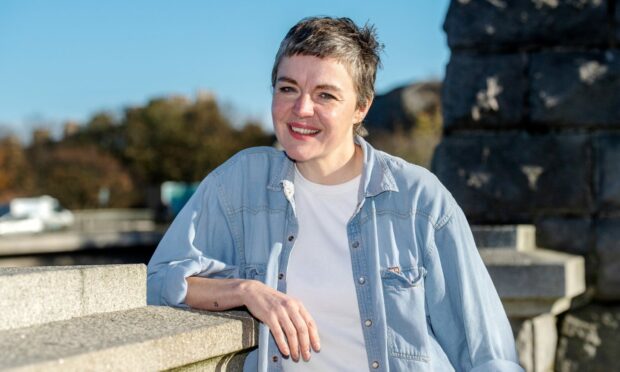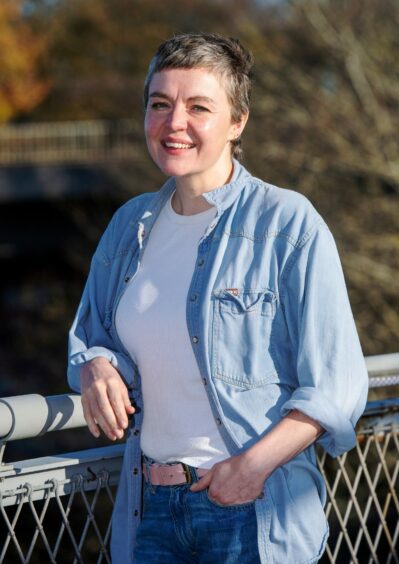When Sarah Rochester quit drinking, it wasn’t for any of what she assumed to be the usual reasons.
She wasn’t an alcoholic; she hadn’t woken up in a police cell or wrapped her car around a tree.
She wasn’t pregnant, nor was alcohol affecting relationships.
Ok, back when she was a student, she enjoyed being known as ‘one of the boys’ for her ability to pack the drink away.
Once, she was even invited to a friend’s stag weekend, the only woman in a hard-drinking posse of men.
But that was the ’90s, when Ulrika Johnson was downing pints on TV and ‘ladette’ culture was in full bloom.
Now in her early 40s, Sarah drank far less, and held down a demanding job as a comms officer for Aberdeenshire Council.
No, the reason she stopped drinking was simply that she’d had enough. The benefits – the fun times, the camaraderie – no longer outweighed the drawbacks.
It wasn’t a problem, it was just something she wanted out of her life.
So she did something about it.
Using TEDx to share her story with the world
When I speak to Sarah, she is almost one year dry. Chatty and full of energy, she admits to being nervous.
Not because of our interview, but because she’s preparing to do a live recording for TEDx, the zeitgeisty media platform that puts a diverse range of people on stage for a 10-minute talk on a subject of their choice.
The tagline for TED is “ideas worth spreading” and Sarah, from Birsemore near Aboyne, wants to share her experience of quitting booze with the platform’s global audience.
But TEDx involves hours of preparation. The pressure is on to nail the speech, especially because she believes her message is important.
That’s because Sarah is adamant there are more people like her out there. People who want to give up drinking but are unsure of how to do so.
Sarah has gone a year without a drink, but it’s not been plain sailing. Old habits take time to unlearn.
Meanwhile, she has discovered that Scottish society can push back if you dare to navigate it without a drink in hand. The expectations of others are often the main barrier to cutting booze out of life.
“The actual trigger (to drinking) for me was this societal and emotional expectation rather than the clinical need to have a glass of wine,” she says.
This is what she aims to combat; to make people realise that there are many reasons why someone might quit alcohol, and not all of them are extreme.
What she wants, in other words, is to normalise sobriety.
“You might stop drinking but that doesn’t mean that people need to go, ‘Oh my God, are you okay?’”
‘I realised that the reward was waning’
Sarah’s journey away from alcohol started with a question.
“I asked myself, was I really enjoying it anymore?” she says.
“You’ve got this balance, it’s your classic risk-reward relationship with alcoholism. How much reward do you get versus the risk? By about my late 30s, I was getting to the point where I realised that the reward was waning.”
She’d tried cutting back and did Sober October and Dry January.
“But none of it stuck,” she says, explaining that alcohol has a way of “creeping back into your life.”
“I thought, wouldn’t it be lovely to know that no matter what you could always wake up in the morning with a clear head.”
Not that she was drinking a lot. Sarah describes her old self as a “super-average drinker”.
“But what I would always find was that inability to literally just have one glass,” she goes on to say. “Once the bottle of wine was open, I wasn’t finishing it, but I probably would have two or three glasses.”
Convincing people she wasn’t pregnant
So, in November 2021, she didn’t drink for a whole weekend. She then decided not to drink for a week. That turned into a booze-free month.
By cutting it into manageable chunks, she suddenly found she had control over her decision.
“That’s how I still approach it,” she says. “I’m not drinking today. If I’m not drinking tomorrow then the chances are I’m not drinking the day after that.
After convincing herself she could stop drinking, the next step was persuading other people. This, if anything, was harder.
People assumed she was pregnant. After assurances she was not, they then assumed she was an alcoholic.
For Sarah, this was one of the most infuriating parts of stopping drinking: the assumption that she’d hit some sort of rock bottom. Why else, people wondered, would anyone want to stop drinking?
“If there was any other drug that you told people you were going to stop, everybody would be like, ‘That’s bloody brilliant! Well done. Great job!’ But you say you’re going to stop drinking and they go, ‘Ooh, why?’”
The wisdom of calling the fire brigade
To help explain her decision, Sarah leant on an analogy from a book she read, The Sober Girl Society Handbook by Millie Gooch.
“If there was a fire in your house, you would call the fire brigade before it got out of hand,” Sarah recalls. “But we treat drinking as if you have to wait for your house to burn down. Why is that? Why can’t we tackle it before your house burns down?”
It’s a good analogy. But it suggests Sarah’s drinking had the potential to become serious. Did she ever worry she was an alcoholic?
No, she says. But she does admit one thing – that the drinking culture she and other people her age grew up in permanently skewed her relationship with alcohol.
In short, she blames the 1990s.
“Coming of age in the UK in the ‘90s meant that we were part of this kind of ladette culture, which meant that we were only valid as human beings if we could drink men under the table,” Sarah says.
She mentions the stag weekend she went on, and how proud she was to be the only woman.
“Now I look back on that and I realise how absolutely crackers that was. But I think a lot of women in their 40s live with the – pardon the metaphor – hangover of the late ‘90s and the early 2000s.”
Sarah’s mission now is to convince others that giving up alcohol is easier than they think. She is a convert to non-alcoholic beer, which she praises for getting her through potentially awkward social situations by making it look as if she’s joining in.
“You don’t have to stand with a glass of water,” she says with a laugh.
The search for perfection
Despite 12 months of no drinking under her belt, Sarah still has the occasional wobble. Like the time she was on holiday in the Channel Islands with her husband and children.
They were in a pub, on a sunny and warm afternoon. It was a perfect day that demanded the addition of a cold glass of white wine. So, she bought one. Only to immediately take it back to the bar.
“Firstly, it tasted weird,” Sarah says. “And second of all, when I took that sip, I thought well that wine wasn’t the thing that made my situation perfect.
“It was perfect all along.”
Sarah told her story on TEDx in December. View her talk here. For more information on TEDx talks, click here. To read about the Aberdeenshire TEDx speaker trying to revive Doric, click here.




Conversation